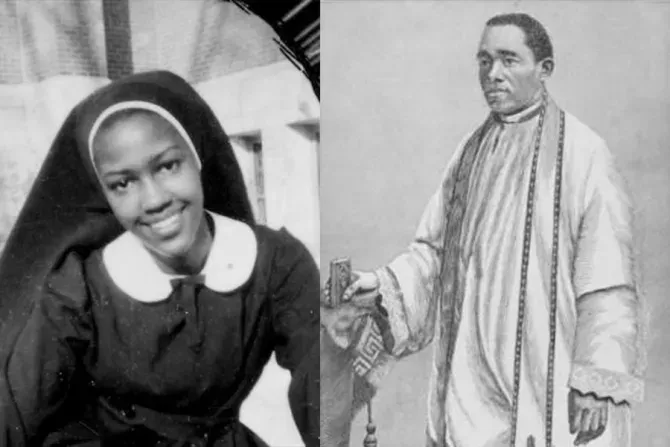 Julia Greeley. . Archdiocese of Denver.
Julia Greeley. . Archdiocese of Denver.
In describing Greeley, Burkey cited the words of Fellowship of Catholic University Students founder Curtis Martin: “Born a slave, half-blind, poor, the object of racism, and alone, Julia simply lived the Gospel of Jesus Christ and loved. Even though she had very little of the world’s material blessings to share, she gathered what she could and shared all that she had from a heart completely transformed by Christ.”
What most impresses him about Greeley, Burkey continued, is “the largesse of her extending Christ’s love in salvific response to the life of crosses others had laid on her.”
Servant of God Sister Thea Bowman (1937-1990) is a Catholic convert from Mississippi. She was a teacher, public speaker, musician, and woman religious who founded the National Black Sisters’ Conference. The Diocese of Jackson opened the cause for her canonization in 2018.
Mary Woodward, chancellor of the Diocese of Jackson, told the Register that Bowman was “a tower of strength and powerful witness to the Gospel of Jesus Christ.”
(Story continues below)
“She continually labored to bring people to the table to learn more about the dynamic role of African American spirituality in the Church, especially liturgical spirituality. She was tireless in her efforts to raise an awareness among African American Catholics of their inherent worth in the Church and their unique gifts to the Church,” she continued.
Venerable Pierre Toussaint (1766-1853) was born in Haiti and came to New York City as a slave. He became a hairdresser. He prospered and was able to secure his freedom. He was a daily communicant, and with his wife, Marie Rose Juliette, engaged in a variety of charitable works. New York’s Cardinal John O’Connor initiated his cause for canonization in 1991, and Toussaint was declared “Venerable” by Pope John Paul II in 1996.
 Courtesy National Catholic Register.
Courtesy National Catholic Register.
Toussaint’s remains are interred in New York’s St. Patrick’s Cathedral in the cathedral crypt alongside of New York’s most prominent Catholic leaders, the only layman afforded this privilege. O’Connor said: “He is now buried beneath this high altar with all of the bishops, archbishops, and cardinals of New York. It will be a great privilege for me to be buried in a vault in the same section with Pierre Toussaint.”
Servant of God Mother Mary Elizabeth Lange (1789-1882) was born in Cuba and emigrated to Baltimore. With a friend, she opened a school for Black children. She became the founder and superior general of the Oblate Sisters of Providence, the first congregation of women religious for women of African heritage. In 1991, Baltimore’s Cardinal William Keeler introduced her cause for canonization.
 Mother Mary Lange. . Wikimedia / Pubic domain.
Mother Mary Lange. . Wikimedia / Pubic domain.
The Mother Mary Lange Guild notes in an online biography that “Mother Mary Lange practiced faith to an extraordinary degree. In fact, it was her deep faith which enabled her to persevere against all odds. To her Black brothers and sisters, she gave of herself and her material possessions until she was empty of all but Jesus, whom she shared generously with all by being a living witness to his teaching.”
Her legacy lives on in the Black religious orders in the U.S. Church today.
As EWTN’s Mark Irons reported on “EWTN News In Depth” this week: “Going back to 1863, in the heat of the Civil War, President Abraham Lincoln declared freedom for many enslaved African Americans with his historic Emancipation Proclamation. But before that, the founder of the Oblate Sisters of Providence, Mother Mary Lange, broke a racial barrier way ahead of her time, and she’s now on the path to possible sainthood. Her mission began right here, in Baltimore, with the founding of this school. More than 30 years before President Abraham Lincoln signed the Emancipation Proclamation, Mother Mary Lange established St. Frances Academy because she believed African American children had the right to an education. And a year later, in 1829, her first group of Oblate Sisters of Providence came together, making vows — embracing a life of service to God and the vulnerable in society, while rejecting racism and accepting those deemed unworthy at the time.”
As Irons explained, Oblate Sister Mary Pauline Tamakloe was inspired to join the order “when she learned about the determination of founder Mother Mary Lange.”
“She often visits the same Person Mother Lange did: Jesus, under the form of eucharistic Bread,” Irons said, adding that “one of the founder’s quotes is: ‘Hasten to the Blessed Sacrament.’ Sister Mary Pauline follows that advice, and that is where she finds her strength.”





 Venerable Henriette DeLille. Public Domain, Wikipedia.
Venerable Henriette DeLille. Public Domain, Wikipedia. Julia Greeley. . Archdiocese of Denver.
Julia Greeley. . Archdiocese of Denver. Courtesy National Catholic Register.
Courtesy National Catholic Register. Mother Mary Lange. . Wikimedia / Pubic domain.
Mother Mary Lange. . Wikimedia / Pubic domain.


